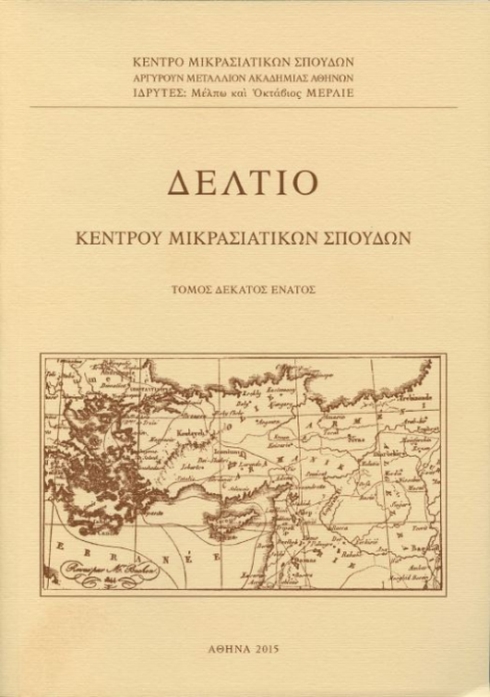Πολιτικὲς ἐπιπτώσεις τῆς ἀγροτικῆς μεταρρύθμισης καὶ ὁ νέος ρόλος τοῦ κράτους στὸν Μεσοπόλεμο
Περίληψη
The article focuses on interwar Greece after the exchange of populations
with Turkey in 1923. The arrival of 1, 2 million refugees to a state of
about only 5 million people deeply affected Greek economy, society
and politics. One significant change was the expansion of the state and
its institutions so as to respond effectively to the survival needs of the
refugees.
The state became much more important to the everyday life of the
Greeks when it initiated the confiscation of large land properties, which
were given to landless local and refugee peasants. This agrarian reform
had major effects on Greek politics since small landowners allied with
the ruling political elite, represented by the two major parties of the era,
the Venizelists and Antivenizelists. By voting en masse for these two
parties, the farmers showed only minimum support for the communist
or the agrarian political party, demonstrating their faith in democracy
and parliamentarism.
Agrarian reform in combination with pro-farmers measures (massive
loans of the banks and substantial tax reduction) greatly benefited the
landowners. On the other hand, excessive lending and the fact that the
farmers had not been given their final titles of ownership made them
dependent on the politicians. However, the latter needed their vote, so
they did everything they could to help them overcome their difficulties.
Banks, jurisdiction, police and other state institutions were controlled
by the politicians who were elected by the farmers. The result was a
lack of class conflict, a situation which contrasted sharply with the major
Greek cities, where bloody confrontations between police and workers
often happened. The mutual interdependence between politicians and
farmers helped maintain social cohesion and parliamentary democracy
until 1936, when the King of Greece approved the establishment of a
dictatorship under Ioannis Metaxas.
with Turkey in 1923. The arrival of 1, 2 million refugees to a state of
about only 5 million people deeply affected Greek economy, society
and politics. One significant change was the expansion of the state and
its institutions so as to respond effectively to the survival needs of the
refugees.
The state became much more important to the everyday life of the
Greeks when it initiated the confiscation of large land properties, which
were given to landless local and refugee peasants. This agrarian reform
had major effects on Greek politics since small landowners allied with
the ruling political elite, represented by the two major parties of the era,
the Venizelists and Antivenizelists. By voting en masse for these two
parties, the farmers showed only minimum support for the communist
or the agrarian political party, demonstrating their faith in democracy
and parliamentarism.
Agrarian reform in combination with pro-farmers measures (massive
loans of the banks and substantial tax reduction) greatly benefited the
landowners. On the other hand, excessive lending and the fact that the
farmers had not been given their final titles of ownership made them
dependent on the politicians. However, the latter needed their vote, so
they did everything they could to help them overcome their difficulties.
Banks, jurisdiction, police and other state institutions were controlled
by the politicians who were elected by the farmers. The result was a
lack of class conflict, a situation which contrasted sharply with the major
Greek cities, where bloody confrontations between police and workers
often happened. The mutual interdependence between politicians and
farmers helped maintain social cohesion and parliamentary democracy
until 1936, when the King of Greece approved the establishment of a
dictatorship under Ioannis Metaxas.
Λεπτομέρειες άρθρου
- Πώς να δημιουργήσετε Αναφορές
-
Αλβανός Ρ. (2015). Πολιτικὲς ἐπιπτώσεις τῆς ἀγροτικῆς μεταρρύθμισης καὶ ὁ νέος ρόλος τοῦ κράτους στὸν Μεσοπόλεμο. Δελτίο Κέντρου Μικρασιατικών Σπουδών, 19, 191–213. https://doi.org/10.12681/deltiokms.326
- Τεύχος
- Τόμ. 19 (2015)
- Ενότητα
- Ημερίδα | Ἡ ἐγκατάσταση τῶν Μικρασιατῶν προσφύγων στὴ Μακεδονία καὶ τὴ Θράκη (1922-1930): Νέες προσεγγίσεις

Αυτή η εργασία είναι αδειοδοτημένη υπό το CC Αναφορά Δημιουργού – Μη Εμπορική Χρήση – Παρόμοια Διανομή 4.0.
Οι συγγραφείς των άρθρων που δημοσιεύονται στο Δελτίο διατηρούν τα δικαιώματα πνευματικής ιδιοκτησίας επί των άρθρων τους, δίνοντας στο περιοδικό το δικαίωμα της πρώτης δημοσίευσης. Άρθρα που δημοσιεύονται στο Δελτίο διατίθενται με άδεια Creative Commons 4.0 και σύμφωνα με την άδεια μπορούν να χρησιμοποιούνται ελεύθερα, με αναφορά στο/στη συγγραφέα και στην πρώτη δημοσίευση για μη κερδοσκοπικούς σκοπούς και με δικαίωμα τροποποίησης μόνον με παρόμοια διανομή (αν αναμείξετε, τροποποιήσετε, ή δημιουργήσετε πάνω στο υλικό, πρέπει να διανείμετε τις δικές σας συνεισφορές υπό την ίδια άδεια όπως και το πρωτότυπο).Λήψεις
Τα δεδομένα λήψης δεν είναι ακόμη διαθέσιμα.



